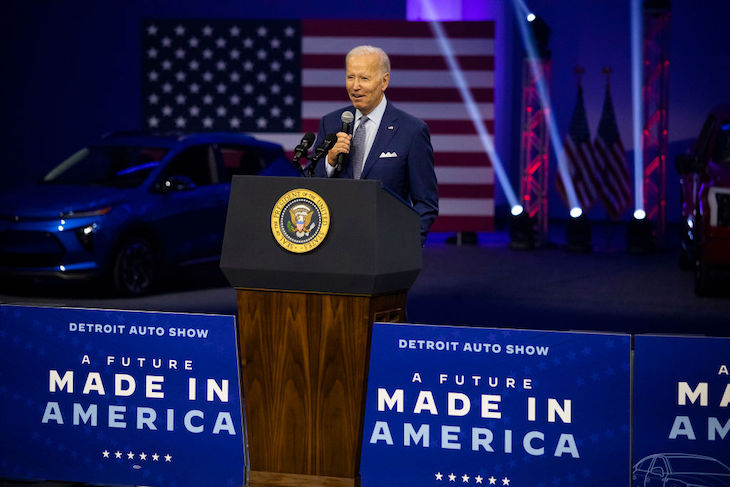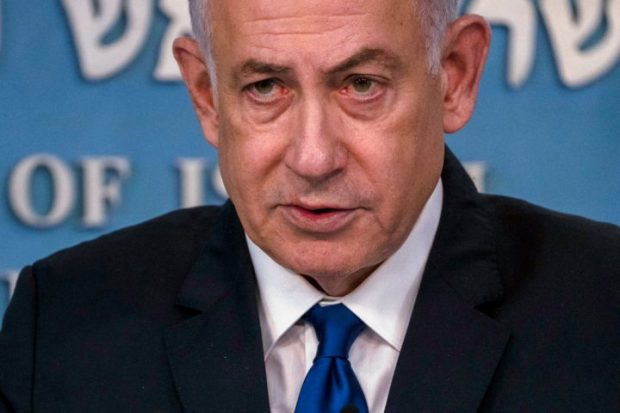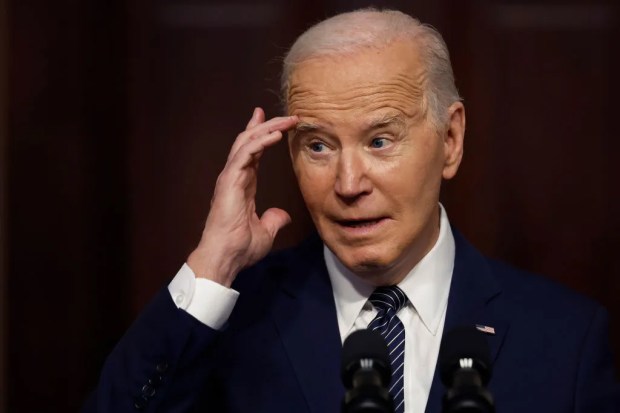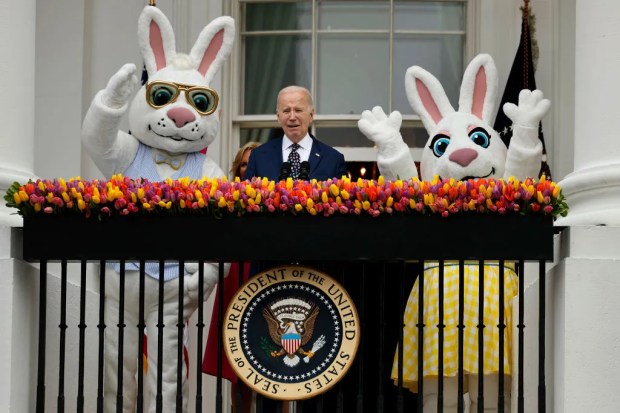A trade war is brewing between the United States and its closest allies. When Thierry Breton, the EU’s internal markets commissioner, pulled out of a summit with US officials just before Christmas, he complained that the agenda ‘no longer gives sufficient space to issues of concern to many European industry ministers and businesses’. A few days before, Emmanuel Macron cornered senator Joe Manchin in Washington DC. ‘You’re hurting my country’, the French president told Manchin. The senator was given a similarly frosty reception at the World Economic Forum in Davos, where Germany’s Olaf Scholz and Luxembourg’s Xavier Bettel accosted him caustically.
The Europeans are upset about Joe Biden’s Inflation Reduction Act (IRA), written by Manchin’s office, which commits $370 billion (£300 billion) to clean energy projects based in North America.
Quite how that reduces inflation is an open question. The IRA is the biggest green subsidy in US history, intended to bolster America’s eco-industries against China’s growing dominance by cutting Chinese firms out of various green supply chains.
By trying to hollow out China’s renewables lead, the US is sucking production, investment and research out of friendly nations
In the process, however, the new Act has also cut out friendly nations which don’t have trade deals with Washington. The EU, South Korea, Japan and, lately, the UK all furiously complaining that the legislation violates the spirit of free trade between nations. Their barely concealed suspicion is that they’re being written off as collateral damage in the ongoing trade hostilities between Beijing and Washington; that, when it really matters, president Biden is just as happy as his predecessor to put America first.
For these countries, the biggest sticking point in the IRA is the multi-billion dollar carve out for the electric car industry. Between 2010 and 2020, a quarter of the world’s EVs were made in the EU and only 18 per cent in the US. Yet, to fully access the money made available under the new Act, EVs need to be produced or assembled in North America, and the critical minerals which go into the battery must be partially mined, processed or recycled in the US, or in a country with which the US has a free trade agreement. Seventy per cent of the EVs sold in the States wouldn’t qualify – such as those made by South Korea’s Hyundai, currently second only to Tesla in the US market, since it has no US factory (one in Georgia will become operational in 2025).
Others are excluded because of their use of Chinese batteries. The non-compliant EVs will be up to $7,500 (£6,000) more expensive than the ‘Made in America’ alternatives.
It’s understandable that the Biden administration fears China’s lead in renewables. Widely scorned for being the planet’s biggest polluter, the country has nevertheless become the world’s largest producer of wind and solar energy. And Chinese firms now control 80 per cent of the battery-making capacities for EVs. According to industry analysts, Chinese companies will be leading battery production in Europe within a decade. They’re already vital in the supply chains of Volkswagen and Mercedes-Benz, among others.
China’s own electric car makers are getting good too. The market-leader, Shenzhen-based BYD, now sells more than Tesla. BYD and its peers have made it a priority to take on more foreign markets, so expect to see them in European showrooms soon. Wealthy companies in wealthy countries are gunning for net zero and Chinese renewables companies are all too happy to help meet the demand.
Under the IRA, these companies must now think twice before getting into contracts with Chinese firms. Some car manufacturers are licking their lips at the Biden administration’s largesse, which they intend to tap into by moving supply chains state-side. But that’s bad news for Europe, the U.K. and elsewhere.
By trying to hollow out China’s renewables lead, the US is sucking production, investment and research out of friendly nations. ‘If you’re somebody who has an early-stage technology and want to prove it to then develop a business, it may be now that you’ll think “I’ll go over to the US”’, said Lord Adair Turner at the UK’s Energy Transitions Commission this week.
Already, BMW has announced a $2 billion (£1.6 billion) plant in South Carolina. Swedish battery maker Northvolt is delaying its investments in Germany in favour of crossing the Atlantic; it’s a similar story for British electric van start-up Arrival, which has shelved plans for a UK factory. More companies are likely to follow the money.
America’s allies face a sour truth: access to the Chinese market will only become more expensive as Washington ups the protectionist pressures to force them to decouple from China; at the same time, they risk losing indigenous companies, investments, and know-how to the US. All of this, some bitterly complain, while Washington still expects their help to counter China’s growing power. Bruno Le Maire, the French finance minister, has accused the US of tipping into a Chinese-style industrial policy ‘right before our eyes’ while the South Koreans are labelling it a ‘betrayal’.
Washington probably didn’t expect this level of bitterness. At Davos, senator Manchin told journalists: ‘I didn’t know it would be this intense, to be honest with you’.
So what can Brussels or Seoul do? Threats to appeal to the World Trade Organisation fall empty as Washington continues a Trump-era boycott of the organisation that has paralysed its appeals process. Biden could ease the pain by giving friendly nations an exemption, something that the US Treasury has signalled it’s looking into.
But the episode has triggered the EU’s own protectionist instincts – the Commission is now seriously looking into loosening state aid rules ‘to give our answer, our European IRA’, says Ursula von der Leyen, the Commission’s president. This could include funding new tax credits with money left over in the EU’s €800 billion (£650 billion) Covid relief fund.
The IRA has fired the starting gun on a global, green subsidy race. Some in Britain are agitating for Westminster to join – the Confederation of British Industry warns this week that the UK is falling behind for lack of state funding, while Labour claims to have drawn up plans of borrowing £28 billion a year for a ‘Green Deal’ for this purpose.
Whatever happens, this episode seems to confirm an uncomfortable suspicion for those in Brussels, Seoul and beyond: that, though the US is rallying supporters in a global contest against China, it will still sell out its allies when American interests are at stake. Perhaps the most effective counter to ‘America First’ is for others to put themselves first — and spend accordingly.
Got something to add? Join the discussion and comment below.
Get 10 issues for just $10
Subscribe to The Spectator Australia today for the next 10 magazine issues, plus full online access, for just $10.





















Comments
Don't miss out
Join the conversation with other Spectator Australia readers. Subscribe to leave a comment.
SUBSCRIBEAlready a subscriber? Log in